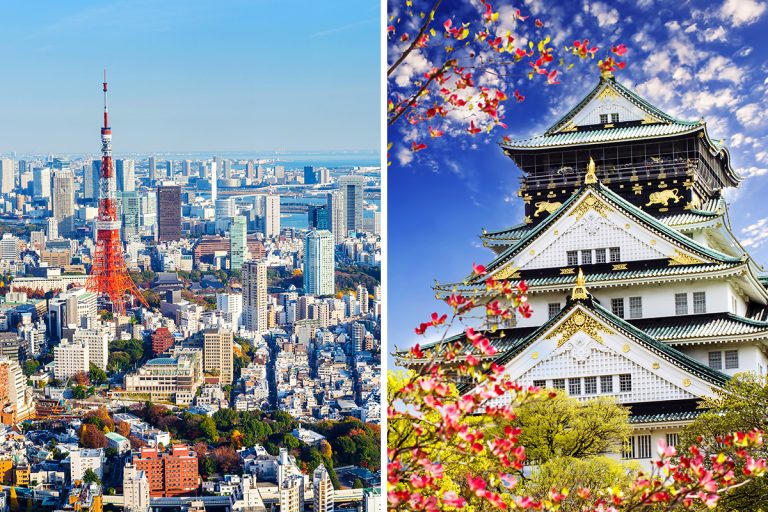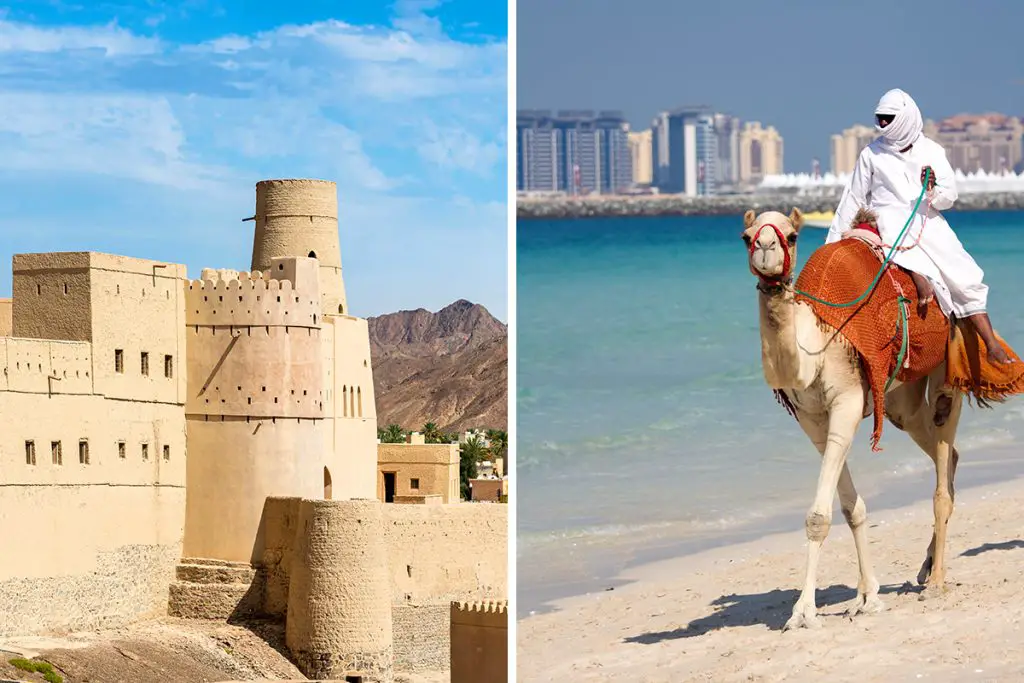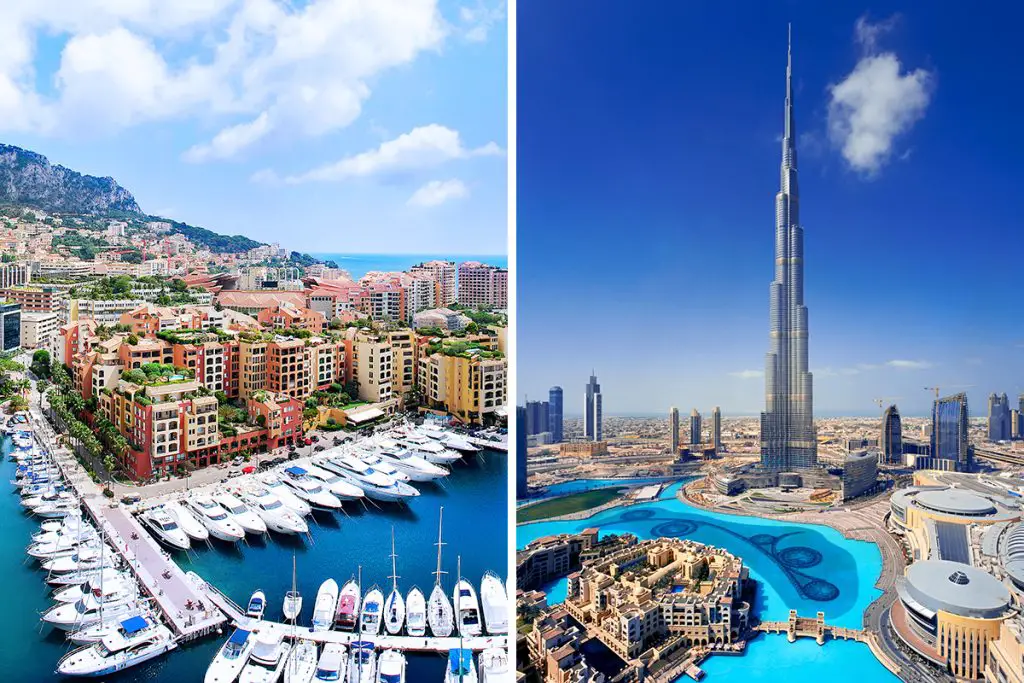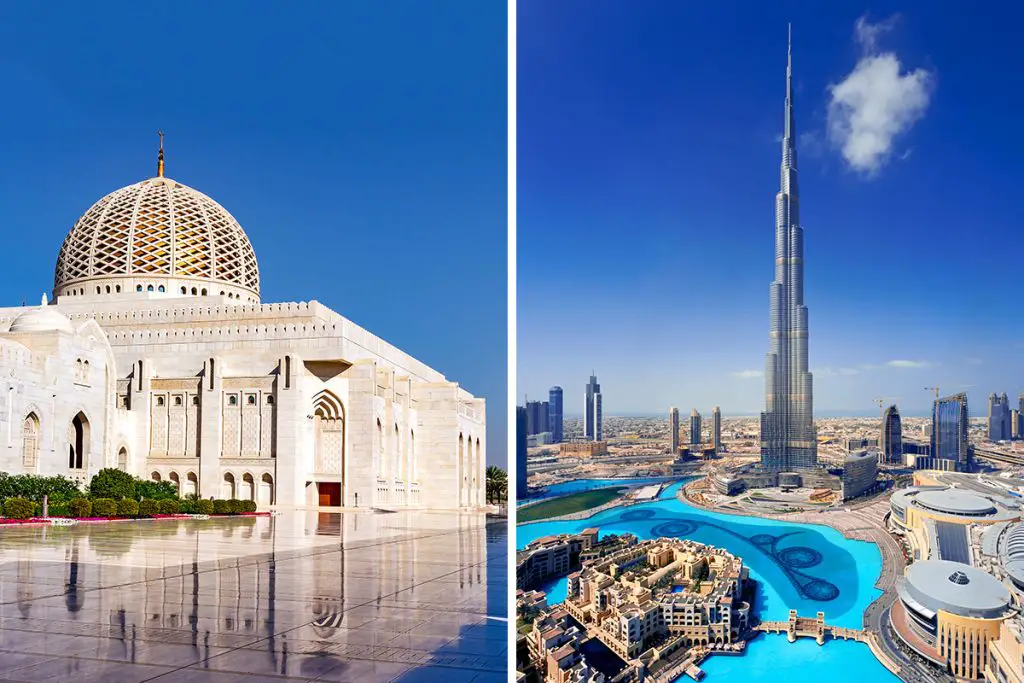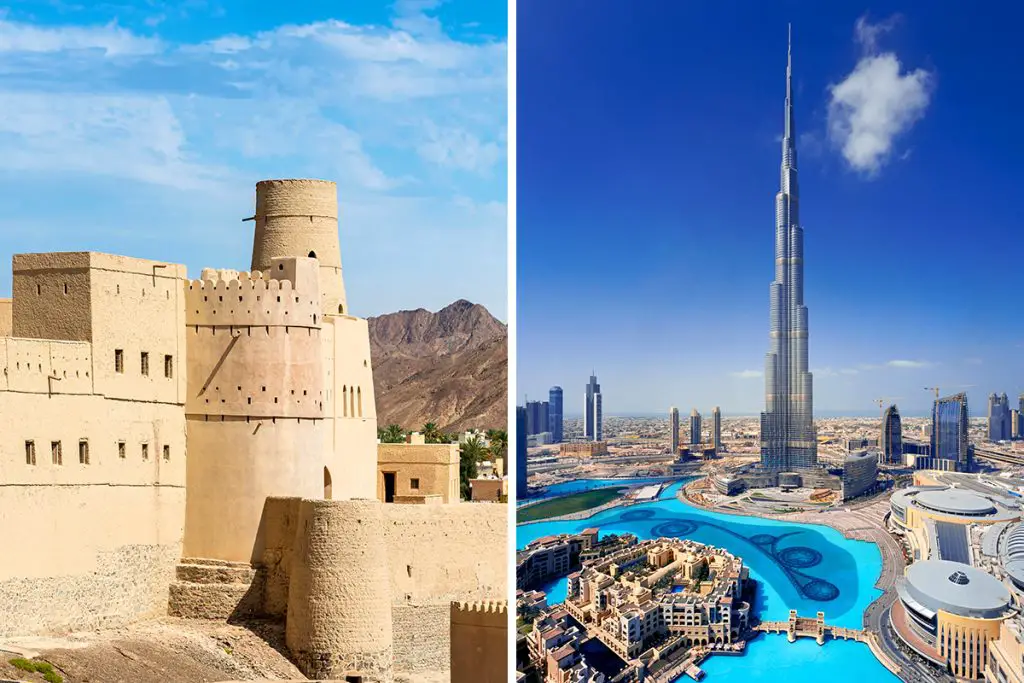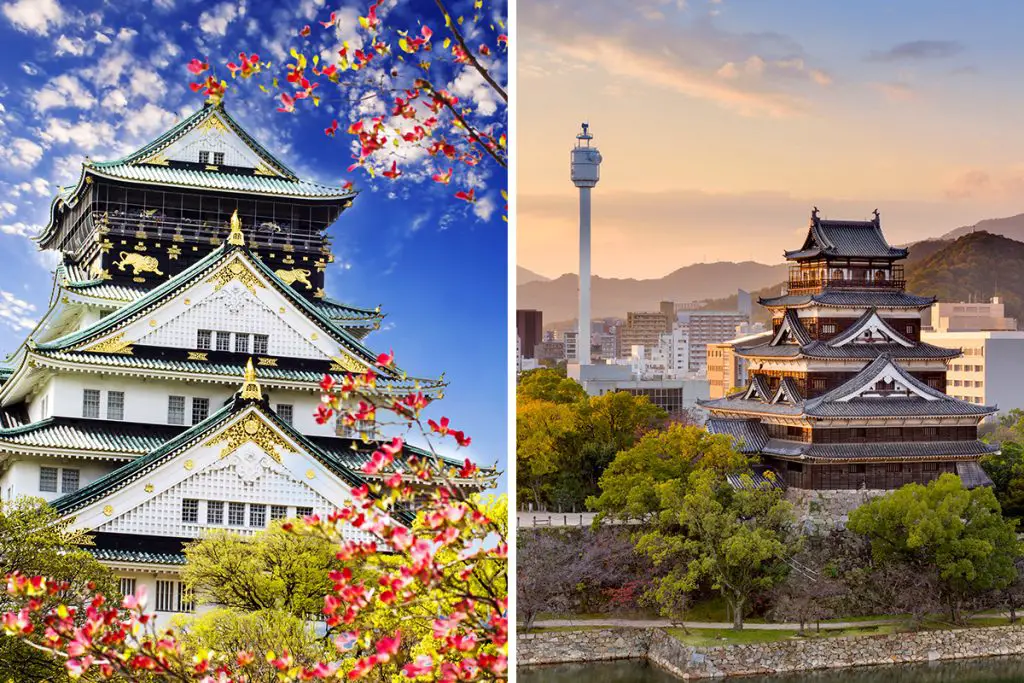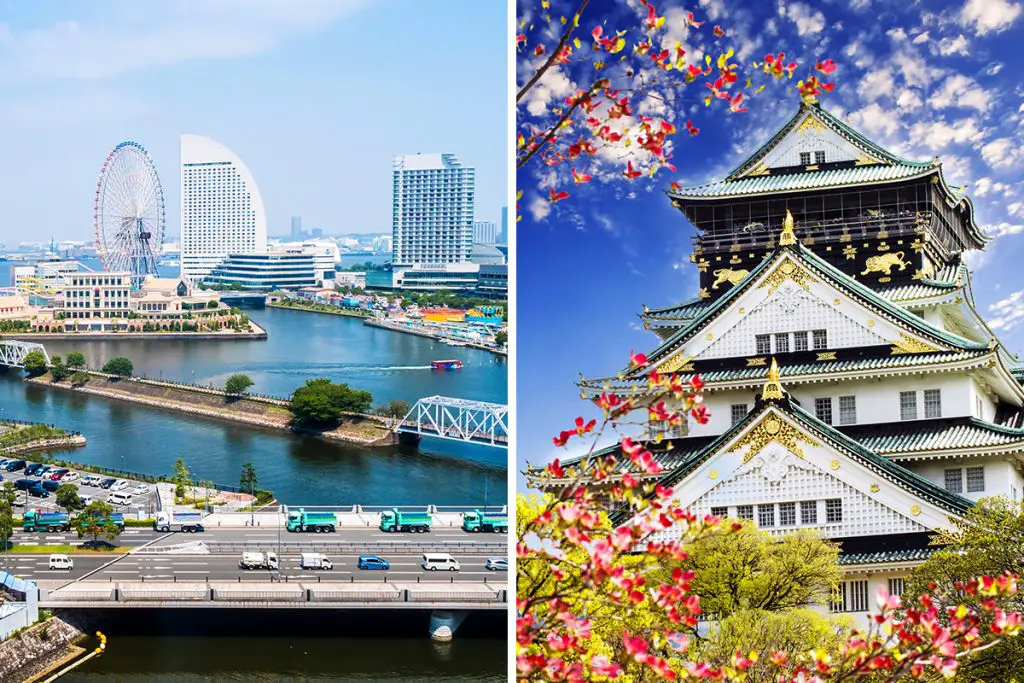You may feel torn between the lure of Tokyo’s high-tech allure and Osaka’s cultural richness. Each city serves as a unique gateway into the essence of Japan. The choice depends on what you’re hoping to get out of your journey. So, dig in and learn more about what sets these two phenomenal cities apart.
History & Culture
First off, let’s delve into the history and culture of these fascinating cities. Understanding their past and cultural significance can help you figure out which city aligns with your interests.
Tokyo, once known as Edo, is the capital city and the epitome of modern Japan. But don’t let its towering skyscrapers fool you; the city has ancient roots going back hundreds of years. Temples and shrines coexist harmoniously with contemporary architecture.
Tokyo is also a city that sets trends in fashion, technology, and pop culture. If you’re keen on staying ahead of the curve and soaking in the future today, Tokyo should be high on your list.
Osaka, on the other hand, was once the merchant capital of Japan and carries a rich history. Known for its role in the unification of Japan in the 16th century, Osaka offers a contrasting experience to Tokyo’s hustle and bustle. The people are known for their warmth and humor, and the city itself is less overwhelming in terms of size and pace.
If you value a blend of historical depth and a touch of modernity, Osaka could be the ideal destination for you.
Both cities have left an indelible mark on Japan’s history, but they showcase it in unique ways. Tokyo’s culture is geared towards the future, continually pushing the boundaries of what’s possible. Osaka leans into its historical roots, offering a glimpse into the Japan of yesteryears while still embracing modern comforts.
So, when it comes to history and culture, your choice boils down to preference. Are you inclined towards the futuristic vibe or do you find charm in a city that takes pride in its heritage? Either way, you can’t go wrong with Tokyo or Osaka.
Attractions & Activities
Alright, let’s shift gears and talk about the attractions and activities that Tokyo and Osaka offer. Both cities have their own unique experiences that can make your trip unforgettable. It’s time to find out which city offers the activities that make your heart sing!
Tokyo is a haven for those who appreciate both history and modernity. You can visit the ancient Senso-ji Temple, which dates back to the 7th century, to get a feel for traditional Japanese culture. If technology is more your speed, you won’t want to miss TeamLab Borderless, a mind-blowing digital art museum.
From traditional tea ceremonies to ultra-modern virtual reality experiences, Tokyo’s attractions offer a wild ride.
Osaka has its own blend of historical and modern attractions. One can’t-miss spot is Osaka Castle, an iconic structure that offers panoramic views of the city. For something more contemporary, check out the Kaiyukan Aquarium, one of the largest public aquariums in the world, with its mesmerizing display of marine life.
You’ll find that Osaka offers a more laid-back set of activities that are no less enchanting.
The nature of the attractions also differs. Tokyo’s attractions often focus on individual experiences and are geared towards those who appreciate intricate details. Osaka’s attractions, on the other hand, are generally more communal and laid-back, providing a more collective form of enjoyment.
So, in a nutshell, if you’re looking for a blend of ultra-modern and deeply traditional attractions, Tokyo should be your pick. However, if you’re after a mix of historic landmarks and modern but laid-back activities, Osaka could be your dream destination.
Eating, Drinking & Nightlife
So, you’re interested in the culinary scenes, the drinking culture, and the after-dark vibes of Tokyo and Osaka? Both cities offer a plethora of options that can satisfy your palate and keep you entertained till the wee hours. Let’s dig into the details to help you make your choice.
Tokyo is the Mecca for food lovers. From high-end sushi bars like Sukiyabashi Jiro to local ramen joints in Shibuya, this city offers a culinary journey that’s nothing short of epic. The flavors here often tend towards the refined and delicate, echoing the city’s cosmopolitan nature.
In contrast, Osaka is often referred to as the “Kitchen of Japan.” Street food is a big deal here. Think takoyaki (octopus balls) and okonomiyaki (savory pancakes). Osaka’s food scene is hearty and down-to-earth, reflecting its merchant past and unpretentious culture.
When it comes to drinking, Tokyo takes it up a notch with its array of cocktail bars and whiskey lounges. The city’s bartenders are artisans, crafting drinks that are both a visual and sensory delight. You’ll find everything from futuristic bars in Shibuya to age-old establishments in Shinjuku.
Osaka, on the other hand, is known for its izakayas (Japanese pubs), where locals and tourists alike enjoy draft beers and sake along with small plates of food. It’s less about the craft and more about the camaraderie, fitting for a city known for its friendly locals.
As for nightlife, Tokyo offers everything from high-energy clubs in Roppongi to live music venues in Shibuya. Osaka’s nightlife is a bit more localized but no less fun, with a plethora of karaoke bars and comedy clubs offering an authentic experience.
In summary, Tokyo and Osaka offer contrasting but equally satisfying eating, drinking, and nightlife experiences. Whether you want refined or hearty meals, artisanal cocktails or friendly izakayas, or an expansive versus localized nightlife, each city has something unique to offer.
Shopping
Let’s move on to shopping, a topic that excites just about everyone! Whether you’re looking for high-end brands or quirky local goods, Tokyo and Osaka won’t disappoint. So, what makes these cities stand out from each other in terms of shopping?
Tokyo is a shopping paradise for those who love variety and sophistication. Places like Ginza are filled with luxury stores from international designers. For unique finds, head to Harajuku, where you’ll see a blend of cutting-edge fashion and vintage treasures. Akihabara is your go-to spot for all things tech and anime.
Osaka’s shopping scene is quite different but equally enthralling. The Shinsaibashi Shopping Arcade is a must-visit, offering everything from big-name brands to independent boutiques. For a more traditional shopping experience, check out Kuromon Ichiba Market, where you can buy local goods, handicrafts, and souvenirs.
In Tokyo, the experience is often about more than just shopping. Many stores offer a sensory experience, with curated interior designs and highly trained staff who go out of their way to provide exceptional service.
Osaka’s shopping experience is less about the frills and more about the deals. People in Osaka love a good bargain, and you’ll find plenty of sales and discounts if you know where to look.
In conclusion, Tokyo offers a shopping experience steeped in luxury and diversity, while Osaka provides a more laid-back but equally rewarding retail therapy. Each city offers a unique shopping experience that reflects its own local culture and trends.
Accommodation
Finding the perfect place to stay is a big part of any trip, and both Tokyo and Osaka offer a range of options that cater to different tastes and budgets. From lavish hotels to cozy guesthouses, let’s see what these cities have in store for you.
In Tokyo, luxury knows no bounds. Hotels like the Aman Tokyo or the Four Seasons offer world-class services with jaw-dropping views of the city skyline. Even mid-range hotels often come with top-notch amenities and are usually situated near major metro stations for ease of movement.
Osaka has its share of luxury hotels, like the St. Regis or the Ritz-Carlton, but the city also offers a broader range of budget-friendly options. You’ll find many guesthouses and hostels in neighborhoods like Namba and Umeda, providing easy access to the city’s major attractions.
Space is at a premium in Tokyo, so rooms tend to be smaller, especially in budget and mid-range hotels. In Osaka, you’re likely to get a little more room for your money, making it a good option for those who like to stretch out a bit more.
Tokyo hotels often come with extra perks like multi-lingual concierge services and shuttle buses to popular spots. Osaka’s accommodations, while generally less extravagant, prioritize comfort and convenience, offering localized tips and community-driven experiences.
In summary, Tokyo offers a more luxurious but compact stay, while Osaka provides more space and a homey atmosphere. Your choice will depend on what you value more—premium service or laid-back comfort.
Family-Friendliness & Children’s Activities
Traveling with family? Both Tokyo and Osaka have plenty to offer in terms of family-friendly environments and activities that will delight the kids. Let’s get down to the nitty-gritty to help you decide.
Tokyo Disneyland and Tokyo DisneySea are the flag-bearers when it comes to family entertainment in Tokyo. The city also has interactive museums like the National Museum of Nature and Science, where learning and fun go hand in hand.
Osaka’s Universal Studios is a hit among families, especially with attractions like The Wizarding World of Harry Potter. Osaka Aquarium Kaiyukan is another popular spot, where children can marvel at various forms of marine life.
In Tokyo, many public spaces like Ueno Zoo or Asukayama Park offer playgrounds and picnic spots. These are ideal settings for some family downtime. In Osaka, you have options like Tennoji Zoo and Nakanoshima Park for similar outdoor fun.
Tokyo often has child-friendly workshops and activities happening in places like Odaiba or Roppongi Hills. Osaka, too, has its share of workshops and interactive sessions, particularly around the Osaka Castle area, that are educational yet fun.
In a nutshell, Tokyo offers a fast-paced yet enchanting family experience filled with world-renowned theme parks and interactive spots. Osaka provides a more relaxed but equally enjoyable atmosphere, great for families who prefer fewer crowds and more intimate experiences.
Getting There & Getting Around
Getting to and around Tokyo and Osaka can shape your travel experience significantly. From flights to local transportation, let’s explore how these cities stack up against each other.
Tokyo is served by two major airports: Narita International Airport, about 37 miles (about 60 km) from central Tokyo, and Haneda Airport, around 8.7 miles (about 14 km) from the city center. Osaka’s Kansai International Airport is situated approximately 31 miles (about 50 km) from downtown Osaka. All these airports are well-connected to their respective city centers.
In Tokyo, the metro system is intricate but efficient. It connects you to almost every corner of the city. Tickets can be a bit on the pricier side but are offset by the convenience and speed. In Osaka, the subway system is less complicated and a bit cheaper, offering a user-friendly way to explore the city.
Taxis in Tokyo start at a higher base fare compared to Osaka. But in Tokyo, you also have the option of using a vast network of buses. Osaka doesn’t have as extensive a bus network, but it’s often not needed due to the city’s compact nature.
If you prefer to cycle, Tokyo offers bike-sharing programs, though the city’s busy traffic can be a challenge for some. Osaka is more bike-friendly, with less crowded streets and many cycling paths.
To sum it up, Tokyo has more transit options and is better suited for those who don’t mind navigating a complex but efficient transportation system. Osaka offers a simpler, more straightforward way to get around, which may be more appealing to some travelers.
Weather
Weather can make or break a vacation, so it’s crucial to consider the climate when choosing between Tokyo and Osaka. Both cities experience four seasons, but there are subtle differences that could influence your travel plans.
Tokyo’s summer months, from June to August, can get hot and humid, with temperatures often reaching up to 90°F (32°C). July and August are particularly sultry, which can make outdoor activities less enjoyable. On the other hand, Osaka experiences a similar summer climate but is generally a tad warmer.
Winters in Tokyo, from December to February, are relatively mild with temperatures dropping to as low as 36°F (2°C). Snowfall is rare but not unheard of. Osaka’s winters are slightly milder, with temperatures rarely falling below 39°F (4°C).
Both cities experience cherry blossom seasons in spring, specifically around late March to early April. Tokyo usually sees blossoms a bit earlier due to its slightly cooler spring temperatures.
The rainy season is another factor to consider. Tokyo’s wet months are June and July, while Osaka experiences its highest rainfall in June. Osaka tends to be more humid during this period, which might not be everyone’s cup of tea.
In summary, Tokyo offers a more moderate climate but can get slightly colder in winter and less humid in summer. Osaka tends to be warmer and more humid overall. Your preference for certain types of weather could very well tip the scales in favor of one city over the other.
Safety
When you’re traveling, safety is paramount. Tokyo and Osaka are both relatively safe cities, especially compared to many other global destinations, but there are some differences worth noting.
Tokyo is often cited as one of the safest cities in the world, with extremely low crime rates. It’s a city where people often leave their belongings unattended without fear of theft. Osaka also has a low crime rate but is known for having slightly livelier neighborhoods where you should keep an eye on your belongings.
In terms of natural disasters, Tokyo is more prone to earthquakes due to its location. Osaka, although not entirely free from seismic activities, experiences them less frequently.
Public health facilities are top-notch in both cities. However, Tokyo has a larger number of English-speaking medical professionals, which can be an advantage for travelers who don’t speak Japanese.
Tokyo also tends to have more well-lit streets and a more extensive CCTV network, adding an extra layer of security when you’re out and about. Osaka does have CCTV and well-lit areas, but they are not as widespread as in Tokyo.
In summary, both cities are relatively safe with low crime rates. Tokyo has the upper hand in terms of earthquake frequency and public health facilities, while Osaka offers a safe environment but with fewer frills.
Cost
Budgeting for a trip involves balancing various costs, including food, lodging, and transportation. Tokyo and Osaka offer different price points that can significantly impact your travel budget.
Tokyo is generally more expensive. A meal at a mid-range restaurant could cost around 1,000 yen (approximately $9) to 6,000 yen (approximately $54). A night at a 3-star hotel averages about 375 US dollars.
Osaka offers a slightly cheaper experience; you can have a decent meal for around 1,500 yen (approximately $13.50) to 5,700 yen (approximately $51.50) and find a similar hotel for about 170 US dollars.
Transportation is also pricier in Tokyo. A one-way ticket on the Tokyo Metro costs 170 yen (approximately $1.50), while in Osaka, you’ll spend about 130 yen (approximately $1.20) for a comparable journey on the subway.
In Tokyo, you can expect to pay more for experiences like guided tours or entry to certain attractions. Osaka generally offers cheaper alternatives but still provides a rich cultural experience.
In summary, Tokyo tends to be more expensive in almost all aspects, from dining and lodging to transportation and activities. If budget is a significant factor for you, Osaka may be the better choice.
Which Is Better – Tokyo or Osaka?
Deciding between Tokyo and Osaka can be a challenging task. Both cities are brimming with life and have unique offerings that can cater to various tastes and preferences. Here’s a final rundown to help you make an informed choice based on multiple aspects.
When it comes to history and culture, Tokyo offers a moderate climate with a rich tapestry of traditions, while Osaka brings a warmer, more laid-back environment. If you prefer a city with a more cosmopolitan vibe and slightly cooler weather, Tokyo is your go-to. However, if you’re seeking a warmer, more down-to-earth atmosphere, Osaka might be more to your liking.
For attractions and activities, Tokyo offers more variety and is a touch more expensive. Osaka, while less varied, offers a rich cultural experience at a somewhat lower cost. If budget isn’t a concern and you want a wide range of things to do, Tokyo is the place. If you’re on a budget but still want a fulfilling experience, Osaka wins here.
Regarding beaches, Tokyo and Osaka don’t have significantly different offerings. If this aspect isn’t a primary concern for you, either city would suffice. However, it’s important to note that Osaka is slightly warmer, which may affect your beach experience.
When it comes to eating, drinking, and nightlife, Tokyo is more expensive but offers a broader range of options. Osaka offers a more cost-effective but still vibrant dining and nightlife experience. So, if you’re a foodie who likes to explore, Tokyo might be your heaven. But if you’re looking for good food that’s easy on the wallet, Osaka is your spot.
As for shopping, Tokyo provides a more upscale experience with a higher price tag. Osaka offers plenty of shopping options that are less harsh on your pocket. For luxury shopping, Tokyo is unparalleled, but for budget-friendly options, Osaka takes the lead.
Lastly, if we consider factors like family-friendliness, getting around, weather, safety, and cost, Tokyo offers a well-rounded experience but at a higher price point. Osaka provides a more budget-friendly option without compromising on the experience. Therefore, your choice between Tokyo and Osaka would significantly depend on your budget and the kind of experience you seek.
In conclusion, if you’re looking for a more cosmopolitan, diverse experience and are willing to spend a little more, Tokyo is your city. If you’re on a budget and prefer a more relaxed, warmer atmosphere, Osaka should be your pick. Both cities have a lot to offer, making them excellent choices for different reasons.

